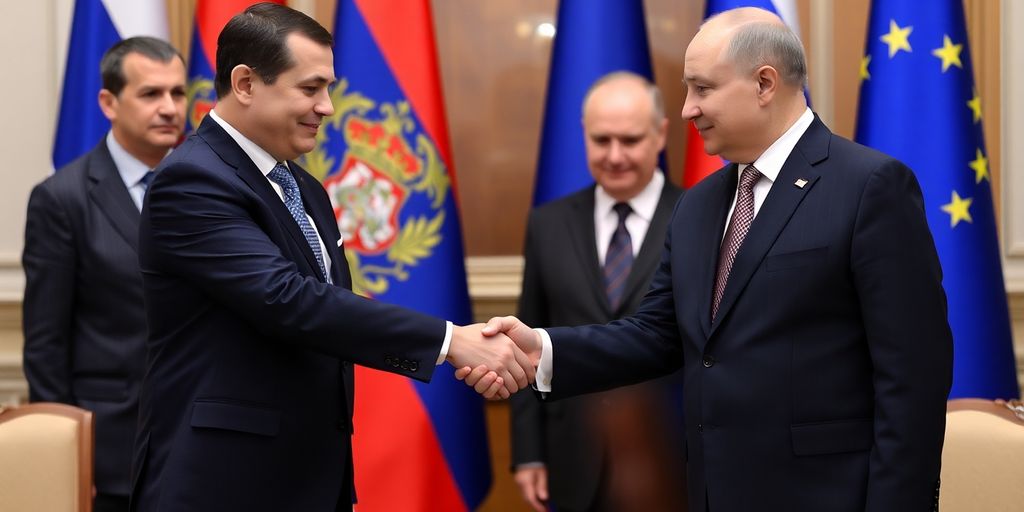Serbian President Aleksandar Vučić made headlines this week by visiting Moscow to attend the Victory Day parade, despite facing significant criticism from the European Union. His trip, which included meetings with Russian President Vladimir Putin and Chinese President Xi Jinping, has raised questions about Serbia’s commitment to EU integration amid ongoing geopolitical tensions.
Key Takeaways
- Vučić attended the Victory Day parade in Moscow, commemorating the 80th anniversary of the victory over Nazi Germany.
- The visit comes amid EU criticism regarding Serbia’s foreign policy alignment, particularly its ties with Russia.
- Vučić’s trip included discussions on energy cooperation and bilateral relations with Russia.
- The Serbian president expressed confidence in his foreign policy decisions, stating he would not be silenced by EU threats.
Background of the Visit
Vučić’s visit to Moscow was marked by logistical challenges, including a detour through Turkey and Azerbaijan due to airspace restrictions imposed by Latvia and Estonia. Upon arrival, he acknowledged the expected backlash from Brussels, asserting that any consequences would affect him personally rather than Serbia as a whole.
The Serbian leader’s attendance at the parade was not just a ceremonial gesture; it was a strategic move to reinforce Serbia’s historical ties with Russia. He laid a wreath at the Tomb of the Unknown Soldier and emphasized the importance of the wartime alliance between the Soviet Union and Yugoslavia.
EU’s Response to Vučić’s Visit
The European Union has been vocal in its disapproval of Vučić’s Moscow visit. EU officials have warned that such actions could jeopardize Serbia’s long-stalled accession process. Key points from the EU’s stance include:
- Criticism of Non-Compliance: The European Parliament recently adopted a resolution criticizing Serbia for not aligning with EU foreign policy, particularly regarding Russia.
- Warnings of Consequences: EU officials, including European Commissioner for Enlargement Marta Kos, indicated that Vučić’s visit could complicate Serbia’s EU aspirations.
- Calls for Action: The Socialists and Democrats group in the European Parliament urged EU leaders to respond decisively to Vučić’s actions, emphasizing that siding with Putin undermines Serbia’s interests.
Strategic Implications
Vučić’s visit to Moscow highlights Serbia’s delicate balancing act between maintaining strong ties with Russia and pursuing EU membership. Analysts suggest that:
- Growing Confidence: Vučić appears to be testing the limits of EU tolerance, showcasing his ability to engage with Russia without immediate repercussions.
- Fragmentation Within the EU: The presence of only a few European leaders at the parade, including Slovakia’s Prime Minister Robert Fico, underscores the divisions within the EU regarding its approach to the Balkans.
- Energy Security: Discussions with Putin focused on energy cooperation, with Serbia relying heavily on Russian gas supplies, which complicates its relationship with the EU, especially amid ongoing sanctions against Russia.
Conclusion
President Vučić’s Moscow visit serves as a significant indicator of Serbia’s foreign policy direction and its complex relationship with the EU. As Serbia navigates its path between East and West, the implications of this visit will likely resonate in both regional and international contexts, raising questions about the future of Serbia’s EU aspirations and its strategic alliances.
Sources
- Putin, Vucic reaffirm energy cooperation, historical ties in talks at Kremlin, Anadolu Ajansı.
- Vucic Attends Moscow Victory Parade Amid Barrage of EU Criticism, Balkan Insight.
- Serbian leader Vucic defies EU with Russia visit, France 24.
- Serbia’s President Vučić visits Moscow amid EU criticism, Euronews.
- Serbia’s Vucic trolls EU with Moscow visit, bne IntelliNews.






